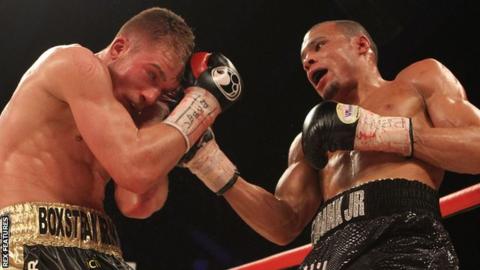
Surgeons are not planning to operate on Nick Blackwell after he suffered a bleed on the brain following his British middleweight title defeat by Chris Eubank Jr in London on Saturday.
The referee stopped the fight in round 10 on the advice of the doctor, who said Blackwell was unable to continue because of swelling over his left eye.
He was taken to hospital on a stretcher and is currently in an induced coma.
A scan on Sunday revealed no increase in the pressure on his brain.
Blackwell’s promoters, Hennessy Sports, tweeted on Sunday: “Thank you all for the messages of support for Nick Blackwell. We will be issuing updates when the time is right.”
Eubank Jr had dominated the fight, bloodying Blackwell’s nose in rounds three and four with a flurry of jabs and uppercuts before landing a number of heavy blows in round seven.
British Boxing Board of Control general secretary Robert Smith said: “I spoke to one of the doctors this morning and he said there is a bleeding of the brain.
“He’s in intensive care, he’s in an induced coma and he is resting and being looked after by the experts.
“It’s a very normal procedure. They put you in a coma to get the swelling to go down. There’s no timescale. Now it’s just a matter of waiting and seeing.”
Sport under attack
It is 25 years since Michael Watson suffered brain damage after his super-middleweight title fight with Chris Eubank, the father of Eubank Jr.
There was no ambulance or doctor at that fight and it was several minutes before Watson received any treatment.
That case sparked major changes in the provision of ringside medical cover, which were all in force at Wembley on Saturday.
Headway, the brain injury association, has offered its support to Blackwell’s family and questioned the lack of protection for boxers.
Chief executive Peter McCabe said “Boxing is an inherently dangerous sport. Every time a boxer enters the ring, there is a significant risk they may sustain a serious and life-changing brain injury.
“At a time when responsible sports are rightly taking action to improve their concussion protocols to ensure participants are properly cared for when accidental collisions occur, it seems perverse that greater attention is not placed on so-called sports in which participants are rewarded for rendering their opponents senseless by targeting the head and causing damage to the brain.”



